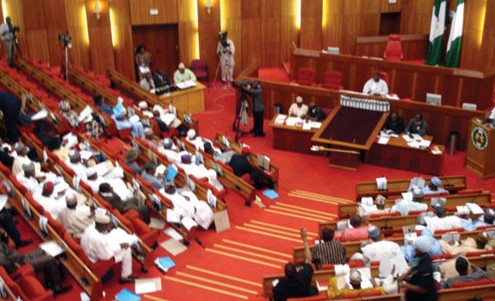* Projects Inflation To Average 26.5%
The International Monetary Fund (IMF) has revised Nigeria’s 2025 economic growth forecast downward to 3.0 per cent from the earlier projection of 3.4 per cent in 2024, citing weakening oil supply and escalating global trade tensions.
The world finamcial imstitution also projected that the country’s headline inflation will average 26.5% in 2025, following a recent rebasing of the Consumer Price Index (CPI) by the National Bureau of Statistics (NBS).
ALSO READ:CBN’s Monetary Policy Gains Traction As Currency in Circulation Drops To N15tn In March 2025
Hower, this is at variance with the current Medium Term Expenditure Framework (MTEF) forecasts which puts inflation rate to cool to 15 per cent in 2025.
The growth forecast was revealed in the Fund’s latest World Economic Outlook (WEO) report released Tuesday at the ongoing IMF/World Bank Spring Meetings in Washington, D.C.
The IMF said the outlook for low-income countries that rely heavily on commodity exports, such as Nigeria, has worsened.
Consequently, it observed that revenues are expected to come under increased pressure as demand from importing countries declines. It noted that oil exporters, particularly, will face a drop in earnings that will strain their fiscal positions.
“Exporters are set to see weakening oil supply and declining revenues, which will affect fiscal space,” the report stated, adding that the pressure is compounded by ongoing market volatility and revaluation of assets.
The Fund warned that the current wave of global trade restrictions, especially the imposition of sweeping new tariffs by the United States and retaliatory measures by trading partners, is introducing an unprecedented level of uncertainty into the global economic system. These trade tensions, the IMF said, are likely to have long-term adverse effects on global demand and investment.
“Effective tariff rates are now at levels not seen in a century,” said IMF Chief Economist Pierre-Olivier Gourinchas. “We are entering a new era as the global economic system that has operated for the last 80 years is being reset.”
Global growth, which remained modest through 2024, is expected to continue its underwhelming trajectory. The IMF now projects emerging market and developing economies to grow by 3.7 per cent in 2025, slowing further to 3.9 percent in 2026. Countries most affected by the new trade barriers, such as China, are seeing significant downgrades to their growth forecasts.
In sub-Saharan Africa, regional growth is expected to ease further, with the IMF warning of increased downside risks. The possibility of a recession in the United States adds to the uncertainty, particularly for countries with strong trade or financial linkages to the US economy.
Global inflation is also projected to decline more slowly than previously anticipated, with headline inflation now expected to average 4.3 per cent in 2025 and 3.6 per cent in 2026. While inflation in advanced economies has seen upward revisions, emerging and developing markets are expected to see slightly lower inflation than initially forecast.
The IMF noted that central banks, particularly the US Federal Reserve, are navigating a delicate period. While inflation remains sticky, projected to stay around 3 per cent in the U.S., additional price pressures are expected due to the recently implemented tariffs.
With governments around the world reassessing their policy frameworks and shifting priorities, the Fund cautioned that the unpredictability of the current environment is making economic forecasting more difficult than ever.
“The landscape has changed dramatically since the start of the year, and the unfolding of these trade measures is a significant negative shock to global growth,” the IMF said.
Meanwhile, inflation rate in the Africa’s most populous country saw a decline to 24.48 percent from 33.2 percent in December 2024 after the change in methodology. In February, it saw a further moderation to 23.18 percent on track for a rate cut by the Monetary Policy Committee, according to analysts.
In a turn of events, March inflation printed higher a 24.23 per cent, the first increase since the change in methodology.
The fund projects a further spike to 37.0 per cent in 2026.
This forecast is contained in the IMF’s April 2025 World Economic Outlook (WEO), which paints a cautious picture of Nigeria’s macroeconomic prospects amid reform-driven adjustments and external volatility. Despite a temporary slowdown in inflation, the Fund warns that price stability remains elusive.














